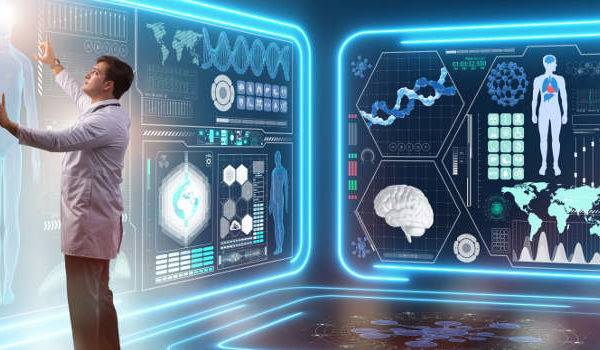A Shoutout To All My Vaccine Hesitant Friends: ‘You’re Not Alone & You Aren’t Crazy’
Shaun DMello is a health writer and climate activist who has served as an editor & writer with a variety of health media publications for nearly two decades. After a brief but colorful career as a bassist in a heavy metal band, he eventually found his calling with health & wellness writing. Shaun is also passionate about human rights and social causes.
For those of us who are lucky enough to have spent decades in publishing and health care media, it’s fairly easy to recognize health misinformation. Unfortunately, that’s not the case for much of the world’s population. While this has already been problematic, undermining democratic institutions and global cooperation, misinformation about the COVID-19 vaccine now poses a health threat to mankind. So, before I address some common COVID-19 vaccine concerns, I’m going to briefly cover the problem of misinformation and disinformation.
Why We’re So Misinformed
The ‘Age of Information’, which began in the 1970s, culminated with the rise of the internet and social media platforms. While this gave everyone a voice, including those most marginalized, it also led to an information overload. This created the perfect environment for the dissemination of false or malicious information, which undermined trust in democratic institutions and health authorities … and so began the ‘Age of Disinformation’.
A Reuters survey found that nearly 70% of Indians rely on smartphones for online news, with 52% getting their news from Facebook and WhatsApp. This is troubling because social media platforms and WhatsApp are gateways for the ‘creation and dissemination of misinformation, such as rumors, spam, and fake news’ due to the lack of accountability. Not surprisingly, a Pew research analysis reveals that Americans who rely most heavily on social media for news tend to have low ‘knowledge about major current events and politics’. Of course, this connection isn’t exclusive to Americans. As democracy, public health and safety depends largely on a well-informed population, misinformation is perhaps the biggest threat we face today.
Vaccine Hesitancy Is Understandable
The ‘Age of Disinformation’ is characterized by widespread distrust in traditional institutions. We have seen how big pharma incentivizes profits over public health and how lobbyists influence state policy, making us skeptical of advisories from government or local health authorities. We’ve all heard of Martin Shkreli of Turing Pharmaceuticals, who raised the price of a life-saving drug by 5000%. Reports also show that big pharma spent $4.7 billion dollars from 1999 to 2018 on lobbying the US federal government. So, a large part of this distrust is not just understandable, but justified. While skepticism is healthy, it’s important that we don’t turn to ‘fact free’ conspiracy theories when making healthcare decisions.
Common Concerns & Arguments Against COVID-19 Vaccination
We are entitled to our own opinions, but not to our own set of facts. When it comes to medicine and healthcare, trusted sources for facts would include peer reviewed studies and scientific consensus, rather than anecdotal stories and sensationalized headlines (especially from Facebook & WhatsApp forwards). If we can just agree on this, we would reach a better understanding of COVID-19 vaccine safety and efficacy. Keeping this in mind, I’m going to address some of the most common concerns that people have with regard to vaccination. I won’t go down the rabbit hole of wild conspiracy theories (such as Bill Gates using vaccines to implant microchips in us). Instead, I’ll focus on fears about vaccination that are based on rational concerns.
Should I worry about COVID vaccine safety & side effects?
A survey by the Delphi Group at Carnegie Mellon University suggests that the primary reason for vaccine hesitancy is a fear of side effects, with nearly 50% of vaccine hesitant adults expressing such concerns. A common refrain is that the cure shouldn’t be worse than the disease. So, let’s look at the effects of both.
COVID-19 infection has caused 4.8 million deaths across the world, out of 236 million confirmed cases, as of 10th October 2021. It results in severe infection in many patients, especially those in vulnerable groups, and can also cause lasting damage to the heart and other organs even in young and otherwise healthy patients who experience mild symptoms and survive the infection.
In comparison, vaccination causes mild side effects including pain at the injection site for a day or two, mild fever or flu like symptoms, and lethargy.
Doesn’t the Johnsons & Johnsons pause prove that vaccines are dangerous?
The Johnson & Johnson (J&J) COVID vaccine was linked to the possible development of cerebral venous sinus thrombosis with 28 reported cases out of 8 million vaccinations. Nevertheless, the Advisory Committee on Immunization Practices (ACIP) decided to pause vaccination until they conducted further investigations. If anything, this demonstrates the diligence and caution with which health authorities review and approve vaccines.
Has the testing really been adequate or are we just guinea pigs?
At the start of the COVID-19 pandemic scientists and health care experts cautioned against high expectations for an early vaccine rollout, suggesting that it could take some years. This of course, raises concerns as to whether the process was rushed and testing was inadequate. The truth is a lot less insidious.
COVID-19 vaccines were able to reach us in record time because researchers had already been studying other coronaviruses for years, which gave them a considerable edge when the COVID-19 pandemic struck. Operation Warp Speed deserves praise as it did not rush the science, but rather focused on significantly cutting through bureaucracy that would have otherwise slowed the process.
What this means is that researchers were able to radically compress timelines for vaccine development and testing, performing simultaneous processes, instead of taking a strictly linear approach. This led to an incredible level of efficiency and also involved greater cooperation between pharmaceutical companies, making the vaccine’s development one of the greatest medical achievements in modern history.
Don’t mRNA vaccines cause changes in DNA?
Some people who are reluctant to get vaccinated with mRNA vaccines are concerned about the risk of the vaccine modifying their DNA. This is understandable, considering the implications of DNA changes in terms of cancer and other serious diseases. However, this notion is unfounded.
As explained by Dr. Paul Offit, co-inventor of a rotavirus vaccine and director of the Vaccine Education Center at The Children’s Hospital of Philadelphia, mRNA does not enter the human genome or the cell’s nucleus, which contains our DNA. Think of it as a key that opens the gate to a building complex. While this key would let you into the building, it would not allow you to enter individual apartments.
Is it true that COVID vaccines can cause infertility?
Women who wish to conceive were obviously concerned about vaccination when they heard stories about the risk of COVID vaccination causing infertility. While it’s a valid concern, these fears were generated by a blog post that falsely claimed that Pfizer’s vaccine included components that could cause the immune system to also attack a specific type of protein that is crucial to placental development. However, this was yet another lie as several studies have demonstrated.
During clinical trials multiple women did become pregnant after receiving the vaccine and only one of them suffered a miscarriage – but she had received the placebo, not the vaccine. A study that included women who were vaccinated during the late second or third trimester with mRNA vaccines found no increased risk of chronic villitis. That’s the term for the condition wherein T-cells attack the placenta, which can result in inflammation and a possible miscarriage. Instead the benefits of vaccination are passed on, as newborns would have inherited immunity to the virus. A JAMA study even found that breast milk after vaccination contained antibodies that could protect infants against infection.
Shouldn’t I worry about vaccines causing infection?
This fear is not unfounded as there are documented cases such as the Cutter Incident of 1955 in which a polio vaccination program caused infection in 40,000 children, left 200 with some degree of paralysis, and killed 10. However, vaccines and safety standards have come a long way since the 1950s. COVID-19 vaccines in the United States and elsewhere are non-replicating vaccines, including mRNA and viral vector vaccines. This means that they cannot reproduce within host cells and cause infection.
Why should I get vaccinated when they are not completely effective?
No vaccine is 100% effective at preventing infection, but to expect such high efficacy would be unrealistic. Most of the current COVID-19 vaccines have high efficacy rates – 95% for Pfizer–BioNTech, 94% for Moderna, 67% for J&J, and 67% for the Covishield vaccines. Covaxin appears to have similar rates of efficacy as compared to Covishield, but an accurate figure can only be provided once we have complete access to all of the clinical trial data. In cases where vaccines fail to prevent infection, vaccinated individuals only experience mild symptoms and are therefore unlikely to succumb to infection.
This can be compared to the efficacy of seatbelts which reduce fatal and non-fatal injuries in front seat occupants by 60% and in rear seat occupants by 44%. If the fact that vaccines are not 100% effective is good enough rationale for avoiding vaccination, then by this logic we should also oppose the use of seat belts, right?
Why should I get vaccinated when their use is unethical?
There have been numerous social media posts claiming that vaccines contain cells from aborted fetuses. The truth is that none of the vaccines available contain any aborted fetal cells, although viral vector vaccines may have been developed using historic fetal cell lines. Moreover, vaccination efforts have also received broad support from a wide range of religious leaders and organizations across India.
Once again, the question of ethics can be compared to driving. As a driver, adherence to speed limits is not just about personal safety as failure to abide by such restrictions also puts others at risk. It is no different with vaccination. While you may be unlikely to suffer severe infection, you could unwittingly pass on the virus to others.
Should I Be Worried About Vaccine Related Deaths?
Vaccine-related deaths are often sensationalized but they do not reflect the full picture. For instance, the deaths of 6 people during the Pfizer-BioNTech COVID-19 vaccine trials made headlines, but only 2 of them had received the vaccine, while the other 4 were given placebos. Investigations found no causal relationship between the vaccine and mortality and the number of deaths was in keeping with normal death rates for the general population.
A viral story also claimed that thousands of individuals died as a result of vaccination, as per data from the U.S. Vaccine Adverse Event Reporting System (VAERS). What the content creators failed to mention is that VAERS is a database where anyone can submit information that is unverified. In fact, the CDC clearly states, “the reports may contain information that is incomplete, inaccurate, coincidental, or unverifiable.” Dr. James R. Laidler demonstrated this quite effectively by reporting that the influenza vaccine turned him into The Hulk – his report was accepted and entered into the VAERS database!
It’s also important to note that association does not imply causation. What does this mean? Simply because x number of people die after receiving a vaccine, that does not mean that the vaccine caused those deaths. If we were to use this flawed logic of causation by association, we could say that because x number of people die while sleeping, all those deaths could be categorized as a result of sleep.
The information shared here is based on current data. Health guidance and recommendations can change over time, but this does not make it any less valuable. Our modern scientific method has inbuilt error correction mechanisms and offers no absolute truths. The consensus of today may change tomorrow as the scientific method is based on rigorous investigation and following the evidence no matter where it takes us. What is important is that we trust in the science.




